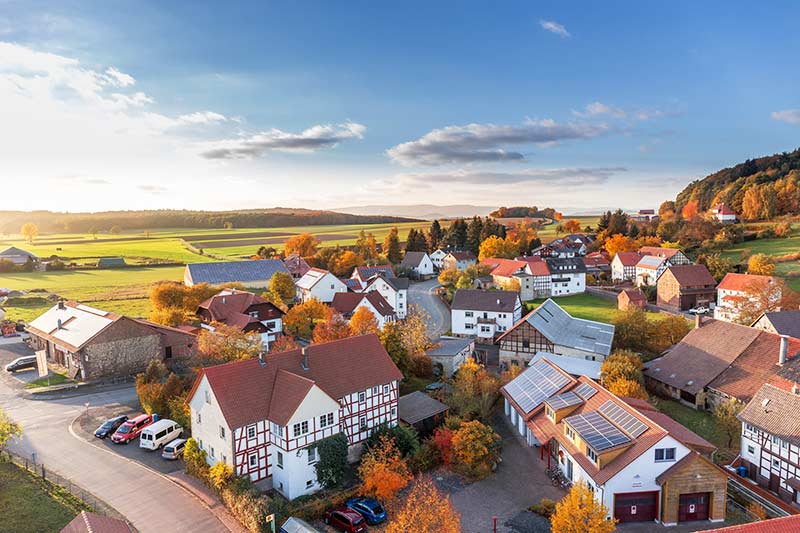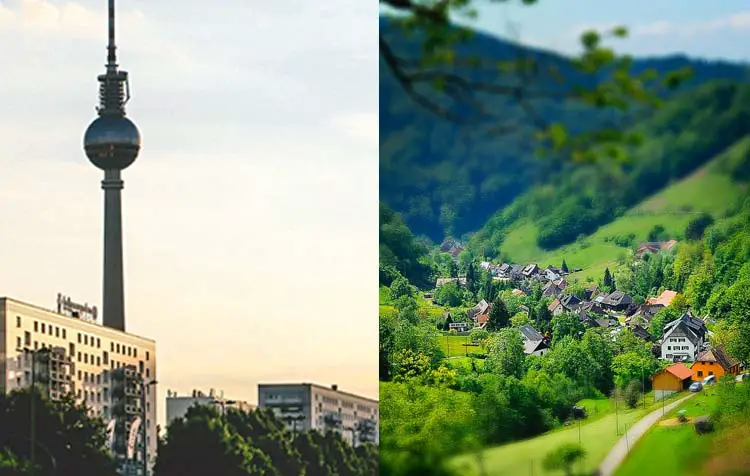Can you live more sustainably in the city or in the country? The Environmental problems of our time are multiplying and intensifying! There is no question that we have to change our lifestyle. However, people who would like to avoid this change as much as possible often say things like "I live in the village, it's too hard to live ecologically there" or "in the city, everything is paved over and dirty - a sustainable life is not possible there. So you can't really live sustainably either in the country or in the city. live sustainably?
I am a village child who lives in the city! In this article I would now like to dare the city VS countryside comparison and compare the respective advantages for a sustainable life. Afterwards, you will find out where it is actually possible to live more ecologically and environmentally conscious. Let's go!
Advantages of city life and disadvantages of country life for a sustainable everyday life

First, let's take a look at the aspects of sustainable living that are fundamentally easier to function in the city:
- New developments: New products and offers (e.g. vegan food or vegan restaurants) are often first available in the metropolises before they are then adapted in the countryside.
- Short travel distances: Sustainable offers and services are usually available right on the doorstep or at least without a long and energy-intensive journey by car.
- Availability: There are more sustainable shopping options available to us in the city than in the countryside.
- Carpooling: Carpooling is easier to organize in the city. In the countryside, people don't live so close to each other, so the Travel to work are more difficult to reconcile.
- Öffi's: Public transportation every minute, usually close to home, fewer people need to commute. Therefore greater dependence on the car in the countryside.
- Car-free: One car is usually enough - many people even live car free! Households in the countryside often have more than one carbecause the distances are longer and the connections are not versatile.
- Selection: The choice of leisure activities such as "offline" shopping and thus more sustainable consumption options is greater in urban areas.
- Sharing: Also, sharing or using items is easier in the city with many neighbors than in the countryside.
- Nature awareness: Also in the city there are with parks or Urban Gardening Opportunities to actively do something for your own Environmental awareness and biodiversity.
- Living space: Apartments in cities are usually much smaller than in the countryside and therefore consume less energy per person.
So people who live in the city often have a better carbon footprint because they consume less land and less energy.
Advantages of country life and disadvantages of city life for a sustainable everyday life

The city has done well! But there are also many advantages that country life has to offer in terms of sustainability:
- Biodiversity: In the countryside you have more opportunities to create a species-rich and Bird friendly garden to design.
- Homegrown: In the home hamlet with more garden space is easier to grow their own fruits and vegetables.
- Deceleration: Life in the countryside is slower, consumption tends to slow down a bit. City dwellers live faster, are more stressed and consume more quickly.
- Markets: The regional farmers' market is more accessible in the countryside than in the cities.
- Personal: Direct contact with organic farmers is also easier to establish and maintain in the countryside.
- Tree stand: In the countryside it is easier to plant a tree because of the larger area.
- Composting: In the countryside with its own garden can be easier a Create compost pile and process organic waste into fertile soil.
- Consumption brake: Due to the oversupply, city dwellers have fewer obstacles to consuming more than they actually need. In the countryside, it's more the other way around.
- Nature awareness: Appreciation of and connection to nature is easier to maintain in the countryside. For example, because of the better air and less land sealing.
- Closeness to nature: Children can be "implanted" with a love of nature more easily and in a more targeted manner. Environmental awareness is promoted more easily from the very beginning.
- Vacation travel: Rural people are also less likely to fly by air due to the distance to airports - whether for personal or business purposes.
In the countryside, longer journeys are necessary, but the advantages here are deceleration, regionality and a generally high proximity to nature.
City VS country - Where is it better to live sustainably now?
Presumably it is in the City easier to live more environmentally friendly. However, this is mainly due to the fact that people tend to live in smaller areas and have short distances to a variety of leisure facilities. These things contribute decisively to the personal, ecological footprint at.
But many things affect village and city people alike! Vegan diet you can, for example, everywhere - and to do without plastic is not that complicated either in urban areas or in the countryside. Where you live does play a role in the sustainability of your lifestyle. But an excuse for an environmentally destructive way of life is of course not the own place of residence! Above all, it is important to start in the first place, to become aware of the negative consequences of one's own actions and to minimize them in a targeted manner.
It is also important to look into the future! Because due to the rural exodus, village regions are suffering from the fact that companies and jobs are also shifting toward the cities. This additional concentration in metropolitan areas makes for even longer journeys and even less diversity in the countryside. The fewer people living in the countryside, the more likely it is that the last bus line will be cancelled. So if more and more people move to the city - for example, because you can simply live more sustainably there - then this will be even more difficult in the countryside! The urban-rural comparison thus shows that it is crucial for our culture that there is a diverse life in both areas. Support measures such as "Urban-Rural-Plus from the German Federal Ministry of Education and Research (BMBF) are sensible measures for linking urban and rural areas more closely again.
Whether urban or rural - what's important for sustainability is your attitude!
Personally, I find living in a village with a large area ideal. Whether city or country is, despite the many advantages and disadvantages, a but really not quite so decisive. It doesn't necessarily matter WHERE you live, but rather HOW you live! It's more important to just start looking at and understanding greener lifestyles, why live sustainably at all should! When it comes to implementation, no one has to do everything perfectly.
The key is to constantly develop, learn and also be willing not to act alone, but as part of a larger whole. In this way, city residents can initiate appropriate projects and, for example, provide more green spaces. In cities, there is often little space left for nature, which makes it all the more important to preserve it and bring new projects to life. Urban trees in particular are an indispensable part and contribute significantly to a better climate. However, this should always go hand in hand with the city administration, in order not to create unwanted dangers. But also country dwellers can support the surrounding farmers even more by buying regional as well as seasonal products or even reach for the bicycle more often to reach the nearest village.
I hope I could help you a little bit with this city vs. country comparison. Where do you find it easier to live ecologically? I look forward to your comments!
Stay sustainable,

PS.: You want to know how to get your improve ecological footprint can? Then just check out the linked article. Have fun!






Uff, so the mentioned advantages for the city are very naive thought.
Public transport every minute, what this eats up in resources to be able to offer this option.
All the concrete and little green space. Also the high environmental impact (all the things that are in the stores have to go into the city - also water and afterwards also out again).
"Sharing" goes the same way in rural areas, there is less sharing because there is less need.
Building infrastructure (electricity, fresh water, etc.) is naturally more expensive in rural areas because there are fewer users. On the other hand, maintenance costs are lower due to less wear and tear.
That a big city per seh is more sustainable, so I read your "pro", I can not understand. Big cities have too many problems for that.
Comments are closed.